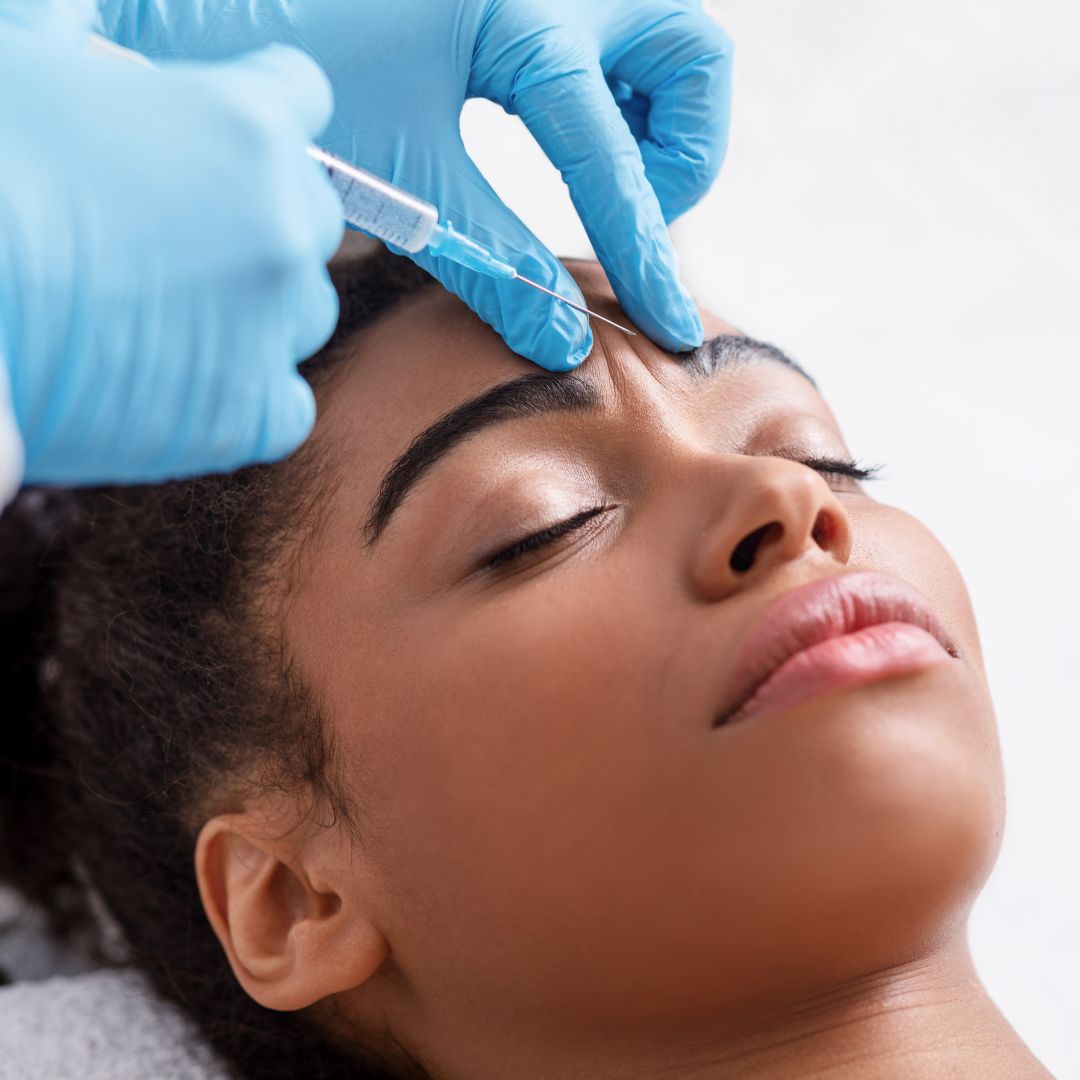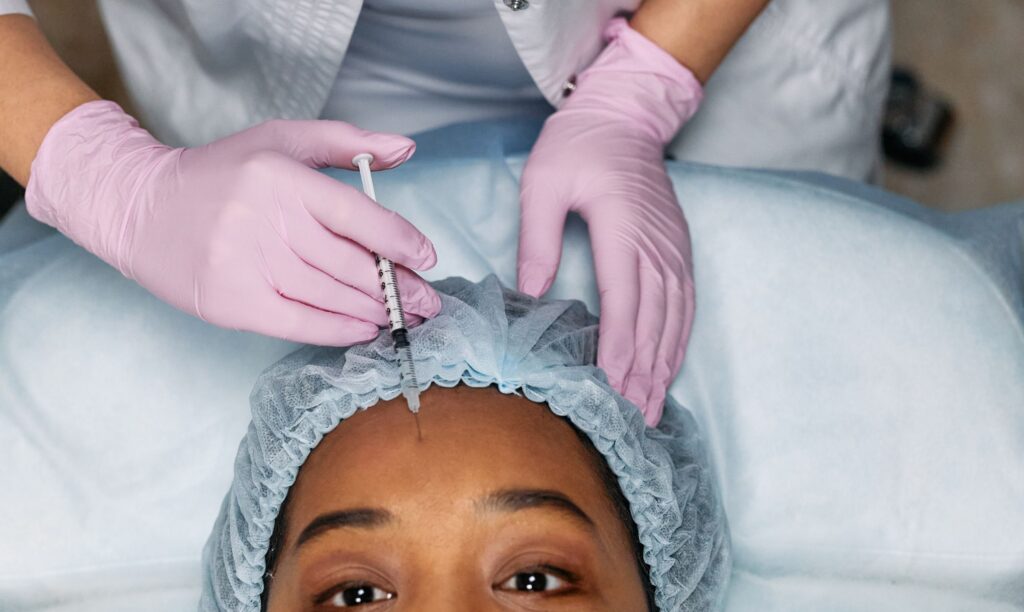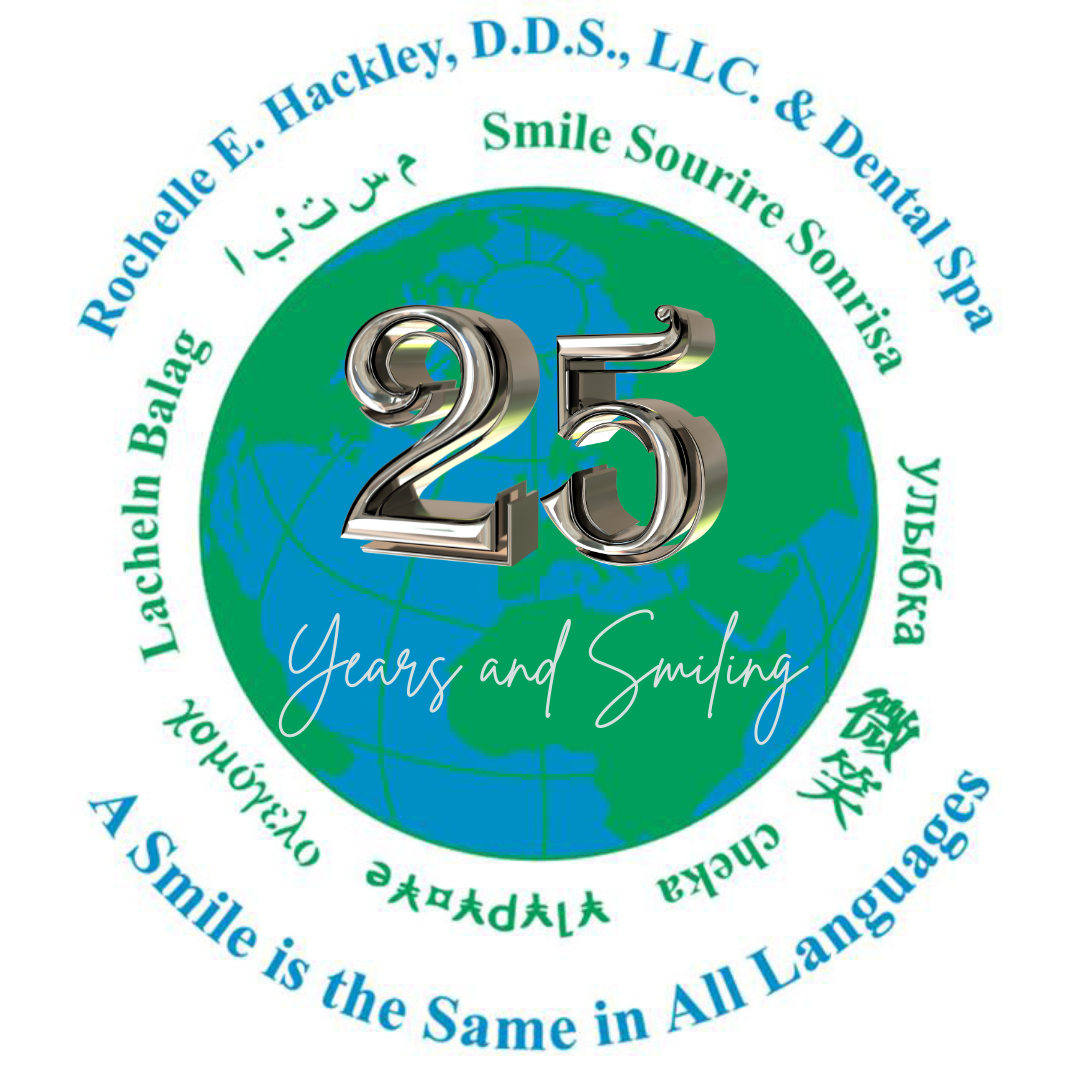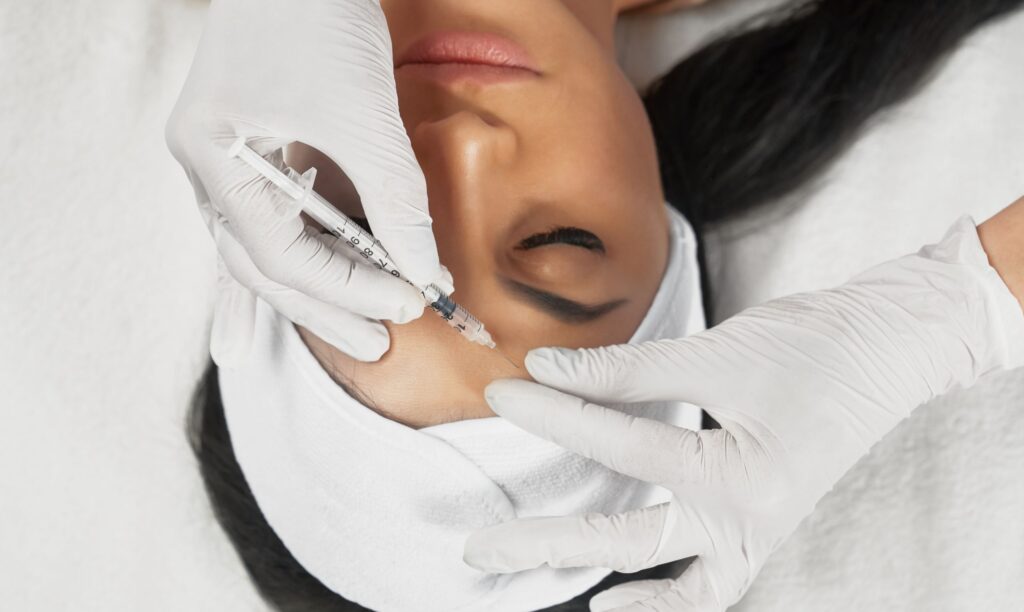Botox is a popular treatment well known for its effectiveness and safety. It’s also one of the most affordable rejuvenation treatments on the market. So, how much does Botox cost in Rockville? You can find out now.
What is Botox?
Botulinum toxin works by temporarily relaxing muscles in your face that are responsible for wrinkles and fine lines. It is a quick, easy procedure with results that last around 3 months or longer.
How is Botox Priced?
Unlike some treatments that are priced per session, Botox is priced per unit. This means that you only pay for what you need. That’s a significant financial benefit.
How Much Botox Do I Need?

The cost of Botox in Rockville depends heavily on the number of units you need. Here are some of the most common treatment areas and the average amount of Botox patients need to treat that area.
- Crow’s feet: 5-15 units
- Forehead Lines: 10-25 units
- Frown Lines: 10-25 units
- Chin: 2-6 units
- Marionette Lines: 3-6 units
- Eyebrow Lift: 2-5 units
- Jaw Area: 15-50 units per side
- Lines Around the Nose: 5-10 units
[Related: 5 Reasons to Try Botox]
Cost of Botox in Rockville Maryland
So, now that we know how many units you might need, you can figure out how much Botox will cost in Rockville. On average, you can expect to spend $15-$30 per unit for Botox, but this price varies based on your location, the provider’s expertise, and other factors. The best way to get an accurate estimate is to schedule a consultation with a Botox injector.
Schedule a Consultation- Rockville Botox Injector
At Rochelle E. Hackley DDS Dental Spa, we believe that oral health and personal rejuvenation can go hand-in-hand. That is why our experienced team includes qualified estheticians who are well-versed in Botox® products and treatments. We can assess your skin treatment options and, if necessary, walk you through the benefits of Botox injection treatments. Please contact Hackley DDS today to schedule a consultation with our specialist.
IPL laser facials in Rockville are a great way to erase sun damage and address a number of skin concerns. IPL is proven to reverse the signs of aging by removing damaged or discolored skin and boosting collagen production. Are you ready to get a fresh new face? IPL is the perfect fall treatment!
What is IPL?
IPL, or intense pulsed light, is a technology that uses short pulses of broad-spectrum laser light to erase visible signs of aging. Studies show how IPL therapy repairs the signs of aging and helps prevent future signs as well. Patients can transform their skin with IPL laser facials. Get smoother, more even toned, more beautiful skin.
What Can IPL Treat?

IPL is used to treat a variety of skin concerns. Some of the most common include:
- Age spots
- Sunspots
- Dark spots
- Rosacea
- Scarring
- Acne and acne scars
- Redness
- Broken capillaries and spider veins
- Enlarged pores
- Birthmarks
- Discoloration of the skin or nails
- Freckles
- Sunspots
- Hyperpigmentation
- Uneven skin tone and texture
- Wrinkles and fine lines
How It Works
Your provider holds the device over your skin, and it sends pulses of broad-spectrum light into the deep layers of your skin. These light waves target melanin and hemoglobin in the skin, releasing blemishes and blotches as well as hyperpigmentation. Since the IPL waves also gently heat the deeper layers of skin, collagen production is stimulated. This reduces fine lines, wrinkles, and scars.
IPL is unique because it produces more than one wavelength of light. So, unlike lasers, it can treat a range of skin conditions simultaneously.
Benefits of IPL Laser Facials in Rockville
There are many benefits of IPL facials. The top benefits are:
- IPL treats a range of stubborn skin issues.
- It corrects signs of aging.
- Get significant results with little downtime.
- Appointments are fast.
- You get long-term results.
- This treatment works great in combination with other cosmetic treatments.
To learn more about the benefits of IPL laser facials in Rockville, please contact Hackley DDS and schedule a consultation with our skincare specialist.
A dental emergency requires immediate care. That’s why we offer urgent dental care in Rockville. Most of these injuries can be serious and lead to further damage if they aren’t treated in a timely manner. Here’s what qualifies as a dental emergency and where to find the best urgent dental care in Rockville.
When to See an Emergency Dentist
A dental emergency is any dental problem that requires immediate attention and care. Not all dental issues are emergencies. If you have pain that won’t go away with medication, bleeding that won’t stop, or broken teeth you need urgent dental care. The following are examples of dental emergencies.
Severe Toothache

One of the most common reasons for a trip to the emergency dentist is a severe toothache. Persistent pain is considered a dental emergency. If you are experiencing pain that doesn’t improve with medication, you need to see an urgent care dentist as soon as possible.
Knocked Out Tooth
Another dental emergency is a knocked out tooth. Accidents happen and sometimes that involves teeth. If you lose a tooth, don’t touch the root. Retrieve it by the crown and rinse is gently with water. If possible, put it back in the socket. In cases where that’s not possible, place it in a small container of milk and see your dentist ASAP. If it is returned to its socket within an hour, there is a greater chance of saving the tooth.
Cracked Tooth
For a badly cracked tooth, save and rinse any broken pieces of the tooth. Apply a cold compress to the outside of the cheek, lip, or mouth near your broken tooth to help with pain and swelling. See your dentist as soon as possible.
Dental Abscess
Finally, dental abscesses need immediate care. Dental abscesses are swollen areas or pimple-like infections around the root of a tooth or between your teeth and gums. This is a serious condition that can damage tissue and surrounding teeth. If it is left untreated, it can cause swelling of the face and jaw or potentially spread to other areas of the body. If you suspect a dental abscess, see your dentist immediately.
Urgent Dental Care in Rockville
If you are experiencing a dental emergency, we are here to help. Please contact Hackley DDS immediately to speak to a specialist. Call301-816-3232 between the hours of 9 am and 1 pm or text our emergency line at (301) 602-6068 any time after 1 pm.
Instagram and TikTok made vampire facials popular, but they stuck around because they’re an effective way to improve your skin. Here’s what you need to know about vampire facials in Rockville and what the experts say about it.
What Exactly Is a Vampire Facial?
Vampire facials, or PRP facial treatments, are a microneedling treatment that uses platelet rich plasma to create impressive results. Vampire facials combine the natural power of your blood with microneedling.
During traditional microneedling treatment, tiny needles create micro wounds in the skin. This stimulates collagen and elastin production. With a vampire facial, this is combined with platelet rich plasma, which contains natural growth factors from your own body to stimulate repair and cell turnover.
What Can a PRP Facial Treat?
PRP facials are proven to enhance the skin’s overall appearance. This treatment can improve skin tone, texture, and radiance. It makes skin appear smoother and tighter and gives you a more supple complexion. It also helps erase hyperpigmentation and reduce the appearance of scars.
What to Expect

First, your provider applies a topical numbing cream to your face. While that’s taking effect, the provider draws some blood from your arm, about a tablespoon worth. After the blood is collected, it is put into a special machine that separates the platelet rich plasma from the red blood cells.
After your provider uses the specialized micro needling device to create tiny holes, she will apply the PRP to the skin’ surface. The microchannels serve as pathways from the PRP to penetrate the skin and rejuvenate your face.
After your facial, your skin may look red and slightly swollen, but this only lasts for about a day.
Who Needs a PRP Facial?
Anyone with fine lines and wrinkles, sun damage, or uneven skin tone can benefit from the vampire facial.
How Much Does Vampire Facial Cost?
The cost of PRP is based on many factors. We offer PRP facial for $800 per treatment or a package of 4 facials for $2,400.
Best Vampire Facial in Rockville
Harness the power of your own blood and rejuvenate your face with this easy treatment. To learn more about vampire facials, please contact Hackley DDS today to schedule a consultation.
Patients with darker skin tones can encounter unique challenges when it comes to seeking cosmetic treatments. Some treatments come with higher risks of hyperpigmentation or scarring for people of color. However, there are several treatments that are considered safe for dark skin. Here’s our list of the top cosmetic treatments for dark skin.
Botox & Fillers
Injectable treatments like Botox and dermal fillers are a safe and effective method for improving wrinkles and restoring volume. These treatments are localized and don’t target melanin production, so they are safe for dark skin tones.
HydraFacial
HydraFacial is a completely customizable treatment. It is a multi-step process that cleanses, exfoliates, and hydrates your skin to give you noticeably smoother, more radiant skin.
Chemical Peels

Another fantastic way to refresh skin is chemical peels. Chemical peels exfoliate the skin, erase fine lines, improve skin texture, and address pigmentation issues. Chemical peels are safe for dark skin when performed by trained professionals.
Viora
Viora Reaction is a device that uses radiofrequency waves to stimulate collagen production and enhance your skin. It gives you smoother, tighter skin and improves cellulite. Viora is safe for any skin color.
Microneedling
Microneedling is a minimally invasive procedure that creates micro-wounds in the skin to stimulate collagen production and improve skin texture. It doesn’t rely on light-based technology, so it is safe for dark skin tones.
Morphus8
Radiofrequency microneedling is also safe. Morphues8 combines microneedling with radiofrequency energy to remodel deep layers of the skin rebuild collagen. It can treat many areas of the body and is safe for all skin tones.
Body Contouring
Looking for a way to shed stubborn fat and tone your body? Body contouring is the answer. There are many types of body contouring. Some only target fat, while others focus on reducing fat and strengthening muscles simultaneously. Most of these treatments are safe for all skin tones.
Cosmetic Treatments Safe for Dark Skin
While it can be challenging to find safe treatments for your darker skin tone, we are happy to offer several options that will help you look and feel your best. To learn more about cosmetic treatments that are safe for dark skin, please contact Hackley DDS.
Searching for ways to make Botox last longer? We have the secret. Botox is a wonderful treatment for relaxing overactive muscles. It can erase dynamic wrinkles from many areas of the face and relax muscles in other areas of the body as well. But is there a way to make your Botox last longer?
Be Gentle
To make sure your results last as long as possible, you need to be very gentle with your face for the first few days after Botulinum toxin treatment. Avoid exfoliating or using cosmetic treatments that can irritate the skin. If you are applying and removing makeup or other skincare products, be very gentle.
Sleep On Your Back

Sleeping on your side or stomach can apply too much pressure to the treated areas. This can affect the longevity of your results significantly. Sleeping on your back will help you enjoy longer lasting results.
[Related: Botox Lip Flip]
Exercise the Treated Muscles
Exercising the treated muscles will help the results last longer. Every four hours after your treatment, perform three sets of 40 repetitions of muscle movements, with breaks in between each set. Do this on the day of and the day after treatment. This will help your results last longer but also help you see results faster.
Avoid UV Exposure
Limiting your exposure to UV rays can extend the life of your Botox treatment. Don’t sunbathe or visit tanning beds. Wear sunscreen daily and wear protective clothing when you are in the sun.
Avoid Exercising Right After Botox Treatment
Don’t exercise or engage in strenuous activity for the first 24 hours after treatment. Exercise increases your metabolism which can cause your Botox to wear off sooner. After the first 24 hours, it’s fine to resume your normal activities.
[Related: Botox for TMJ]
How to Make Botox Last Longer – Specialist in Rockville
With the proper care, you can extend the life of your Botox treatment. If you are ready to see what Botox can do for you, please contact Hackley DDS today. Our specialists are highly trained and ready to help you.
This question is frequently asked due to its widespread popularity on the internet. Many are curious about how this treatment works without any side effects. The treatment follows a five-step approach that addresses various skin concerns. Common issues such as acne, pimples, wrinkles, and fine lines are effectively removed, leaving the skin with a radiant and attractive appearance. HydraFacial for wrinkles in Rockville is entirely safe for the skin, posing no risks whatsoever. Moreover, the procedure is quick, utilizing advanced equipment throughout.
Vortex Cleaning
During vortex cleaning, a patented Hydropeel tool, featuring a specialized facial treatment needle or blade, nourishes your skin with a serum rich in nutrients. This serum effectively softens impurities, dirt, and unwanted toxins embedded in your skin. This step is crucial as it prepares impurities for complete removal; without softening, residues may persist. The uniquely designed hydro tip ensures thorough cleansing of skin pores, akin to a vacuum, ensuring a deep and effective cleanse.
Exfoliation
This step involves skin resurfacing using the hydro peel tip, which features multiple edges. This specialized instrument gently exfoliates the skin multiple times with its abrasive edges, a crucial process. Unlike traditional exfoliation methods that can be irritating, this specific tool ensures a smooth experience akin to applying cream. The multiple edges expedite skin resurfacing, aligning cleaned pores swiftly, resulting in even and smooth skin texture. This process is vital for achieving an attractive appearance.
Extraction
In HydraFacial treatments, a vortex of liquid is employed to extract unwanted compounds such as blackheads and whiteheads. Typically, removing these can be painful and time-consuming, but the powerful circulating fluid in vortex extraction efficiently pulls out all impurities, including excess sebum and oil. This leaves the skin clear and rejuvenated. Hydrating agents further enhance the skin’s appearance, imparting a radiant glow. The process is entirely painless, promoting a relaxed and calm experience throughout the treatment, making you feel more attractive.
Fusion
After clearing pores and resurfacing the skin, antioxidants and anti-aging serums are applied. These serums effectively target fine lines, particularly those associated with aging. Using a specialized spiral-tip instrument, the serum is gently infused into the deeper layers of the skin, addressing wrinkles and eliminating unwanted pigmentation. This treatment results in supple, younger-looking skin with a clear, glowing, and spotless appearance.
LED Face Masks
After a HydraFacial treatment, LED masks play a crucial role in skincare. These masks offer various benefits depending on their light type. For instance, the red LED Light mask stimulates cell production of collagen and elastin fibers, promoting supple, youthful skin. This is particularly beneficial for older individuals seeking to diminish wrinkles and fine lines. Conversely, the Blue LED Light mask effectively eliminates acne-causing microbes, reducing infections and benefiting those with oily, acne-prone skin.
HydraFacial Treatment for Everyone
This treatment has become incredibly popular because it’s suitable for every skin type, regardless of age. Whether you’re a teenager or an adult, HydraFacial treatment promises to enhance your skin like never before, delivering highly satisfying results. If you are looking to get rid of fine lines, HydraFacial for wrinkles in Rockville is the best option.The fusion of antioxidants and anti-aging serums is compatible with all skin types, ensuring universal benefits. However, it’s not recommended for pregnant women or individuals with skin cancer. Beyond that, the treatment is infinitely customizable, tailored to address specific skin concerns. Experience this remarkable facial treatment for mesmerizing, radiant skin.
HydraFacials for Wrinkles in Rockville
Are you interested in getting a HydraFacial? Dr. Hackley and her team are the best in the industry. Stop by our office to learn more about this amazing procedure! And if you already know it’s the one for you, schedule your appointment today.
Botox sets the standard for addressing fine lines and wrinkles, particularly unwelcome during summer. It effectively relaxes and diminishes these signs of aging, offering remarkable results in reducing and preventing them on your face. Hackley DDS has summer Botox specials in Rockville.
Benefits of Botox
Botox is a highly sought-after treatment known for its numerous benefits:
- Prevents new wrinkles, folds, and fine lines caused by facial expressions
- Smooths and softens existing frown lines, crow’s feet, and forehead lines
- Lifts eyebrows for a more youthful appearance
- Enhances facial contouring, potentially creating a more heart-shaped face
- Reduces the appearance of chin dimpling (‘orange peel’ look)
- Lifts sagging corners of the mouth and plumps the upper lip
- Minimizes neck lines
- Provides relief for migraines and TMJ pain
- Controls excessive sweating
5 Reasons Why Botox Is Perfect for Summer Season
Despite the intense heat, summer remains an exhilarating season, ideal for outdoor activities by the water—whether at the beach or pool—as well as joyful weddings and BBQs with loved ones.
However, the higher temperatures of summer accelerate water loss, leading to dehydration. Heat also compromises the skin’s moisture barrier, diminishing elasticity and potentially hastening signs of aging. Our summer Botox specials in Rockville can help you achieve your best look.
Did you know that Botox can shield you from summer’s detrimental effects? If you’re hearing about this for the first time, here are five reasons why Botox is your ideal summer treatment!
Botox Outshines the Sunshine
Summer is a highly anticipated season, marked by the beauty of blooming flowers and stunningly painted skies. While we all cherish enjoying the surroundings, it’s crucial to protect your skin from the season’s harmful effects. Botox can enhance your radiance by combating premature signs of aging like fine lines, ensuring you look your best and capture picture-perfect moments!
Botox Keeps You on the Go
You don’t need to endure days stuck at home or miss out on fun activities due to post-procedure care, nor do you require extensive recovery after an invasive treatment. Botox involves a small injection into targeted muscles and requires no downtime! You’ll experience minimal discomfort, if any at all. So, go ahead and enjoy your outdoor activities without skipping a beat!
Botox Won’t Keep You Hiding From the Sun
During your summer getaways, there’s no need to confine yourself indoors. Botox treatments do not require you to avoid sunlight, making them perfect for enjoying the summer season. Remember to always apply SPF to safeguard your skin investment! Say goodbye to hiding from the sun and embrace the great outdoors with confidence.
Botox Does Not Play the Waiting Game
When you’ve got your summer plans set, you wouldn’t want lengthy procedures getting in the way. Botox injections are renowned for their quick and easy treatment process. It only takes a few minutes to administer, and you’ll see results within a week—it’s virtually painless.
Botox Makes You Summer Ready
Botox injections feature a unique FDA-approved formulation that effectively diminishes moderate to severe frown lines, crow’s feet, and forehead lines. You’ll notice visible results as early as 3 to 4 days post-treatment. It’s an ideal way to kickstart your summer before heading to the beach or embarking on other out-of-town adventures, ensuring you’re summer-ready.
Summer Botox Specials in Rockville
If you are looking for the most convenient and comfortable way to be summer ready, Botox is the way to go. Please contact us today to learn more about Botox.
You’ve probably heard the saying, “You are what you eat.” This is especially true for your teeth and gums. The starchy or sugary foods we enjoy are also favorites of the bacteria in your mouth, which can lead to tooth decay and gum disease.
The difference between a healthy smile and frequent trips to the dentist largely depends on your diet. Even with a solid oral hygiene routine—brushing twice a day and flossing once daily—keeping your teeth healthy long-term can be challenging.
Which Foods are Best for Teeth and Gum Health?
Some of the top foods for a healthy mouth are fresh fruits and vegetables, thanks to their high nutritional value and natural teeth-cleaning benefits. Calcium-rich foods, such as low-fat or fat-free milk, yogurt, cheese, fortified soy drinks, tofu, canned salmon, almonds, and dark green leafy vegetables, promote strong teeth and bones. Chewing crunchy foods stimulates saliva production, which, along with water, helps wash away plaque-causing bacteria and food particles.
Cheese, Milk, and Yogurt
Cheese is one of the top foods for a healthy mouth for several reasons. It is low in sugar and high in calcium, and contains casein, a protein that helps fortify tooth enamel. The high calcium content supports bone density, while the phosphate in cheese helps balance pH levels in the mouth, preserving tooth enamel. Additionally, chewing cheese increases saliva production, which helps wash away bacteria.
Besides fluoridated water, milk is the best drink for your teeth. It is rich in calcium and other essential nutrients and lowers acid levels in the mouth, helping to fight tooth decay.
Yogurt is also beneficial, as it is packed with calcium and probiotics that protect against cavities, gum disease, and even bad breath.
Water
Water stands out as the healthiest drink available. Our bodies are composed of 60% water, and staying hydrated helps distribute nutrients, eliminate waste, maintain healthy skin, and keep muscles functioning. Drinking water also significantly benefits your teeth, especially if it’s fluoridated. Fluoridated water, known as “nature’s cavity fighter,” helps prevent cavities. Additionally, water washes away food particles and maintains high saliva levels, promoting oral health.
Leafy Greens (Spinach, Lettuce, Kale)
Super healthy leafy greens are rich in calcium, folic acid, and essential vitamins and minerals that benefit your teeth and gums. Crunchy fresh greens in salads and sandwiches also help clean your teeth.
Apples and Pears
Will an apple a day keep the dentist away? Maybe not entirely, but it certainly helps. Eating apples and other hard, fibrous fruits can clean your teeth and increase saliva production, which neutralizes the citric and malic acids left in your mouth. While sugary apple juice can contribute to tooth decay, fresh apples are less likely to cause problems. Chewing the fibrous texture of apples stimulates your gums, reduces cavity-causing bacteria, and increases saliva flow.
Unlike many acidic fruits, raw pears effectively neutralize acids in your mouth that cause decay.
Nuts
Nuts offer numerous health benefits for your teeth, being rich in essential elements like calcium and phosphorus. Almonds, Brazil nuts, and cashews are particularly beneficial as they help fight bacteria that cause tooth decay. Peanuts are a great source of calcium and vitamin D, while almonds provide significant amounts of calcium, supporting teeth and gums. Cashews stimulate saliva production, and walnuts are packed with fiber, folic acid, iron, thiamine, magnesium, niacin, vitamin E, vitamin B6, potassium, and zinc.
Top Foods for a Healthy Mouth
A diet that promotes good oral health involves not just what you eat, but also when and how you eat. One effective way to protect your teeth is by eating raw foods at the end of meals. These foods help clean teeth, massage gums, and stimulate saliva production, which washes away any remaining food particles. Dr. Hackley and our knowledgeable and compassionate staff are dedicated to helping you create and maintain a smile you love. Contact us today to schedule an appointment!
The MediSpa and beauty industry is experiencing unprecedented growth, with the global market reaching an impressive $16.4 billion USD in 2022. Below are the top Rockville med spa trends to watch for in 2024.
A Focus on Facial Balance
Big, fake-looking lips are “out.” In 2024, one of the biggest Rockville med spa trends is facial balance.
If a client comes in expressing dissatisfaction with a particular problem area or requesting filler in a specific spot, your approach will shift. Instead of simply addressing their request, you will suggest ways to enhance overall facial symmetry, balance, and harmony by developing a customized plan of action.
Dysport Over Botox
Increasingly, young women are opting for Dysport over Botox. Why? It’s widely known that Dysport offers more natural-looking results.
Its special formulation allows it to spread further and faster, making it ideal for treating the forehead—a popular choice among younger women seeking preventative aging treatments. However, for targeting crow’s feet specifically, Botox remains the preferred option.
Neck and Decolletage Treatments
Clients are increasingly noticing differences in skin quality between their face and their neck and décolletage. Anticipate a rise in requests for laser treatments, micro-needling, and other rejuvenating procedures for these areas, aiming to reduce visible signs of aging and maintain overall skin consistency.
Additionally, you can suggest neck and chest treatments to clients who are suitable candidates, ensuring a more harmonious and youthful appearance.
Hand Rejuvenation
Similarly, hands often reveal signs of aging that many women wish to address proactively or reverse.
Intense Pulsed Light (IPL) treatments and chemical peels are effective for rejuvenating the hands and restoring a youthful appearance. Looking ahead to Rockville med spa 2024, fillers are also gaining popularity among women seeking to enhance their hands.
With growing client awareness about hand aging, now is the time to propose personalized hand rejuvenation plans, particularly to your top clients who are willing to invest in maintaining a youthful look.
Customer Loyalty Programs
Loyalty programs with rewards are a standout trend for 2024 in the medical spa industry. These programs benefit both repeat clients and your business alike. Clients can appreciate discounts, free products, and various incentives, while you can foster ongoing loyalty and prevent clients from seeking services elsewhere.
Moreover, consider extending rewards beyond service bookings to actions like social media shares, online reviews, and referrals, enhancing client engagement and satisfaction.
Masseter Treatments
Masseter treatments continue to rise as a significant medical spa trend for 2024, offering a simple, non-surgical method to reduce square-shaped jaws.
Typically involving Botox injections in the jaw area, masseter reductions target specific muscles to reduce their bulkiness. By limiting muscle activity, this treatment helps create a more slender or V-shaped face, particularly sought after by women seeking aesthetic enhancements.
Body Sculpting
Body sculpting is gaining immense popularity as a non-surgical and minimally invasive method to reshape the body. Utilizing radiofrequency and high-intensity focused electromagnetic (HIFEM) energy, body sculpting effectively targets areas like the abs, thighs, back, and arms.
EMSculpt and CoolSculpt are leading choices for equipment in this field, offering effective solutions for enhancing body contours without surgery.
Rockville Med Spa
If you’re looking to try out some of these med spa treatments in Rockville for 2024, Hackley DDS is here to help. As Maryland’s premier dental and med spa provider, our qualified practitioners treat a wide variety of cosmetic needs. Book your appointment with us today.
















